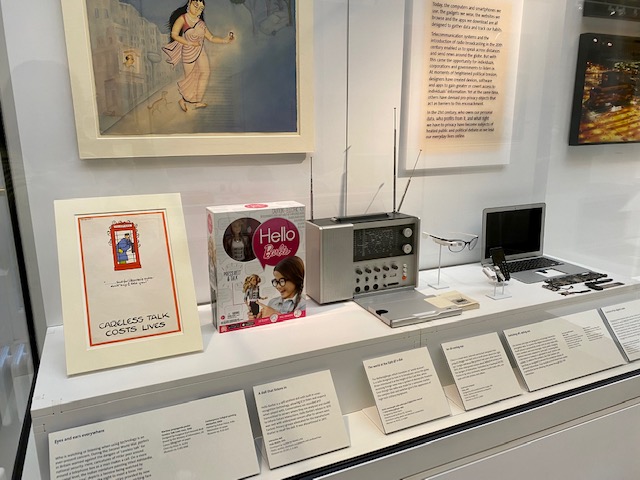Ray-Ban (EssilorLuxxotica) is selling glasses with ‘Facebook View’. The questions have already been asked whether they can be lawful in Europe, including in the UK, in particular in regards to enabling the processing of children’s personal data without consent.
The Italian data authority has asked the company to explain via the Irish regulator:
- the legal basis on which Facebook processes personal data;
- the measures in place to protect people recorded by the glasses, children in particular,
- questions of anonymisation of the data collected; and
- the voice assistant connected to the microphone in the glasses.
While the first questions in Europe may be bound to data protection law and privacy, there are also questions of why Facebook has gone ahead despite Google Glass that was removed from the market in 2013. You can see a pair displayed in a surveillance exhibit at the Victoria and Albert museum (September 2021).
“We can’t wait to see the world from your perspective“, says Ray-ban Chief Wearables Officer Rocco Basilico in the promotional video together with Mark Zuckerberg. I bet. But not as much as Facebook.
With cameras and microphones built-in, up to around 30 videos or 500 photos can be stored on the glasses, and shared with Facebook companion app. While the teensy light on a corner is supposed to be an indicator that recording is in progress, the glasses look much like any other and indistinguishable in the Ray-ban range. You can even buy them as prescription glasses, which intrigues me as to how that recording looks on playback, or shared via the companion apps.
While the Data Policy doesn’t explicitly mention Facebook View in the wording on how it uses data to “personalise and improve our Products,” and the privacy policy is vague on Facebook View, it seems pretty clear that Facebook will use the video capture to enhance its product development in augmented reality.
“We believe this is an important step on the road to developing the ultimate augmented reality glasses“, says Mark Zuckerberg.(05:46)
The company needs a lawful basis to be able to process the data it receives for those purposes. It determines those purposes, and is therefore a data controller for that processing.
In the supplemental policy the company says that “Facebook View is intended solely for users who are 13 or older.” Data Protection law does not care about the age of the product user, but it does regulate under what basis a child’s data may be processed and that may be the user, setting up an account. It is also concerned about the data of the children who are recorded. By recognising the legal limitations on who can be an account owner, it has a bit of a self-own here on what the law says on children’s data.
Personal privacy may have weak protection in data protection laws that offer the wearer exemptions for domestic** or journalistic purposes, but neither the user nor the company can avoid the fact that processing video and audio recordings may be without (a) adequately informing people whose data is processed or (b) appropriate purpose limitation for any processing that Facebook the company performs, across all of its front end apps and platforms or back-end processes.
I’ve asked Facebook how I would, as a parent or child, be able to get a wearer to destroy a child’s images and video or voice recorded in a public space, to which I did not consent. How would I get to see that content once held by Facebook, or request its processing be restricted by the company, or user, or the data destroyed?
Testing the Facebook ‘contact our DPO’ process as if I were a regular user, fails. It has sent me round the houses via automated forms.
Facebook is clearly wrong here on privacy grounds but if you can afford the best in the world on privacy law, why would you go ahead anyway? Might they believe after nearly twenty years of privacy invasive practice and a booming bottom line, that there is no risk to reputation, no risk to their business model, and no real risk to the company from regulation?
It’s an interesting partnership since Ray-Ban has no history in understanding privacy. Facebook has a well known controversial one. Reputational risk shared, will not be reputational risk halved. And EssilorLuxottica has a share price to consider. I wonder if they carried out any due diligence risk assessment for their investors?
If and when enforcement catches up and the product is withdrawn, regulators must act as the FTC did on the development of the product (in that case algorithms) from “ill gotten data”. (In the Matter of Everalbum and Paravision Commission File No. 1923172).
Destroy the data, destroy the knowledge gained, and remove it from any product development to date. All “Affected Work Product.”
Otherwise any penalty Facebook will get from this debacle, will be just the cost of doing business to have bought itself a very nice training dataset for its AR product development.
Ray-Ban of course, will take all the reputational hit if found enabling strangers to take covert video of our kids. No one expects any better from Facebook. After all, we all know, Facebook takes your privacy, seriously.
Reference: Rynes: On why your ring video doorbell may make you a controller under GDPR.
https://medium.com/golden-data/rynes-e78f09e34c52 (Golden Data, 2019)
Judgment of the Court (Fourth Chamber), 11 December 2014 František Ryneš v Úřad pro ochranu osobních údajů Case C‑212/13. Case file


